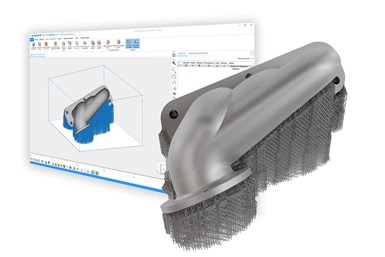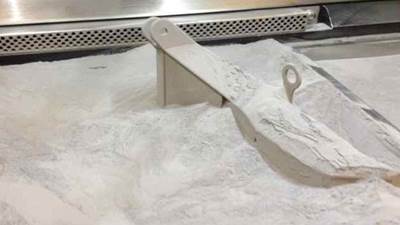Materialise and Renishaw Integrate Systems to Improve Efficiency of Metal 3D Printing
Renishaw system users can now benefit from Materialise’s build processor software as well as its Magics data and build preparation software.
By automating support structure generation with Materialise’s software, additive manufacturers can streamline the 3D printing process. Source: Materialise
Materialise and Renishaw are collaborating in an effort to increase efficiency and productivity for manufacturers using Renishaw’s additive manufacturing (AM) systems. Through the partnership, Renishaw system users will benefit from Materialise’s build processor software tailored to the RenAM 500 series of metal AM systems.
Renishaw users will also have access to Magics, Materialise’s data and build preparation software. This will enable users of Renishaw’s AM systems to build a seamless workflow from design to 3D printed part, control and customize their 3D printing process, reduce production time and increase the efficiency of their AM operations.
For manufacturing companies looking to adopt AM to produce metal parts on an industrial scale using laser powder bed fusion (LPBF), software can enable them to unlock the full potential of the technology by optimizing the 3D printing process and streamlining the workflow. Renishaw’s scanning algorithms combined with Materialise’s accelerated build processors can shorten production time. Also, seamless workflow integration and customizable print parameters at the part level can enhance control and productivity.
“Working with Materialise enables us to support Renishaw users deploying 3D printing in a host of different manufacturing applications,” says Matt Parkes, AM strategic development manager at Renishaw. “Their next-generation build processors, in combination with their software portfolio, complement our recent technology updates. We’re pleased to be collaborating on the tools needed to support the industry as metal 3D printing becomes an essential piece of the manufacturing puzzle.”
Build processors link 3D printers with data preparation software, streamlining the AM process from design to print. Materialise’s build processor complements Renishaw’s recently launched Tempus technology. This new scanning algorithm for Renishaw’s RenAM 500 series of AM machines enables the laser to fire while the recoater moves, saving up to 9 seconds per build layer without reducing part quality. With this advancement, part build time can be cut by up to 50%. Materialise’s build processor software handles data consistently and speeds up data processing of complex geometries and high volumes of parts. Additionally, the new build processor for Renishaw AM systems enables dedicated print parameters at the part level for increased productivity and optimized quality, making it a viable solution for the volume production of different or identical parts.
“This partnership enables a unique approach to efficient metal 3D printing. The combination of Renishaw’s Tempus technology and the ability of Materialise’s build processor to process data at high speeds can significantly reduce production time,” says Karel Brans, senior director of Partnerships at Materialise. “Partnering with 3D printer manufacturers maximizes efficiency by optimizing build preparation and streamlining build jobs. This enables manufacturing at all volumes and levels of customization, allowing users to scale production.”
The build processor for Renishaw AM systems enables users to seamlessly connect to Materialise Magics. This is a technology-neutral data and build preparation software that offers compatibility with nearly all import file formats and connectivity to all major 3D printing technologies. It provides users with advanced workflow control and automation, including the recently launched e-Stage for Metal+. This software optimizes data and build preparation for LPBF systems using physics-based modeling to automate support structure generation.
Manufacturing companies can also rely on the Materialise Build Processor Software Development Kit to create their own intellectual property. The open software system enables them to build their own next-generation build processor tailored to their metal 3D printing application. Customized build processors can help to further enhance cost efficiency, production speed, and part quality, which makes it possible to manufacture intricate parts and mass produce identical or personalized products with consistent quality, reduced scrap rates, and abbreviated lead times.
Related Content
Semiconductors, Tungsten, AM Affordability and More from Formnext 2024: AM Radio #56
The trade show included increased applications for the semiconductor market, machine launches and technology advances aimed at cost cutting, plenty of LFAM and more. Listen to our conversation on Formnext 2024.
Read MoreRobot Vs. Gantry for Large-Format Additive Manufacturing (Includes Video)
Additive Engineering Solutions, specialist at 3D printing very large parts and tools on gantry machines, now also uses a robot for large-format AM. Here is how the robot compares.
Read MoreCarnegie Mellon Helps Industry, Students Prepare for a Manufacturing Future with AM and AI
Work underway at the university’s Next Manufacturing Center and Manufacturing Futures Institute is helping industrial additive manufacturers achieve success today, while applying artificial intelligence, surrogate modeling and more to solve the problems of the future.
Read MoreHybrid Additive Manufacturing Improves Debarking Knife Tip Strength and Production Efficiency
Nicholson Manufacturing chose the Mastercam APlus specialized add-on to unlock hybrid manufacturing for making its debarker knife tips, enabling it to add durable layers to the wear surfaces of the tips to make them more resilient while also making the production process more efficient.
Read MoreRead Next
Postprocessing Steps and Costs for Metal 3D Printing
When your metal part is done 3D printing, you just pull it out of the machine and start using it, right? Not exactly.
Read More3D Printed Polymer EOAT Increases Safety of Cobots
Contract manufacturer Anubis 3D applies polymer 3D printing processes to manufacture cobot tooling that is lightweight, smooth and safer for human interaction.
Read MoreProfilometry-Based Indentation Plastometry (PIP) as an Alternative to Standard Tensile Testing
UK-based Plastometrex offers a benchtop testing device utilizing PIP to quickly and easily analyze the yield strength, tensile strength and uniform elongation of samples and even printed parts. The solution is particularly useful for additive manufacturing.
Read More





















